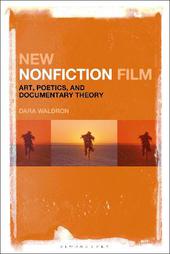
|
New Nonfiction Film: Art, Poetics, and Documentary Theory
Paperback / softback
Main Details
| Title |
New Nonfiction Film: Art, Poetics, and Documentary Theory
|
| Authors and Contributors |
By (author) Dara Waldron
|
| Physical Properties |
| Format:Paperback / softback | | Pages:224 | | Dimensions(mm): Height 229,Width 152 |
|
| Category/Genre | Theory of art
Film theory and criticism |
|---|
| ISBN/Barcode |
9781501362163
|
| Classifications | Dewey:791.43 |
|---|
| Audience | | Tertiary Education (US: College) | |
|---|
| Illustrations |
29 bw illus
|
|
Publishing Details |
| Publisher |
Bloomsbury Publishing Plc
|
| Imprint |
Bloomsbury Academic USA
|
| Publication Date |
20 February 2020 |
| Publication Country |
United States
|
Description
New Nonfiction Film: Art, Poetics and Documentary Theory is the first book to offer a lengthy examination of the relationship between fiction and documentary from the perspective of art and poetics. The premise of the book is to propose a new category of nonfiction film that is distinguished from - as opposed to being conflated with - the documentary film in its multiple historical guises; a premise explored in case-studies of films by distinguished artists and filmmakers (Abbas Kiarostami, Ben Rivers, Chantal Akerman, Ben Russell Pat Collins and Gideon Koppel). The book builds a case for this new category of film, calling it the 'new nonfiction film,' and argues, in the process, that this kind of film works to dismantle the old distinctions between fiction and documentary film and therefore the axioms of Film and Cinema Studies as a discipline of study.
Author Biography
Dara Waldron is a Lecturer in Critical and Contextual Studies at the Limerick Institute of Technology, Republic of Ireland, with a particular focus on Lens-Based media (differing forms of moving image practices). He is the author of Cinema and Evil: Moral Complexities and the "Dangerous" Film (2013).
ReviewsAn important book ... Refreshingly international in its references and framework. The book is at its best when it is engaged in close textual analysis informed by Bresson's modele ... Rich in theoretical scope. * Alphaville: Journal of Film and Screen Media * A much-needed stepping-stone in the unblurring of lines between documentary, nonfiction, and nonfiction film. * Film Matters * [Waldron] is a perceptive analyst, engaging closely with the discursive organisation of his chosen texts and the experience of viewing them, while showing a lively interest in bringing wide-ranging ideas to bear. * Studies in Documentary Film * It is rare these days that a book delivers a new critical concept and category that completely transforms our understanding of cinema, but that's precisely what Dara Waldron does in New Nonfiction Film. Refusing the deadlock between the real and the fictive that has long circumscribed thinking about documentary, Waldron explores contemporary cinematic practices that seek truth by way of fiction. Through a series of revelatory readings of films by John Akomfrah, Chantal Akerman, Abbas Kiarostami, Pat Collins, and Ben Rivers, among others, Waldron's New Nonfiction Film identifies a poetics of the moving image that defines the boldest examples of contemporary filmmaking * Andrew Burke, Associate Professor, Department of English, University of Winnipeg, Canada * Waldron's book offers a much needed contribution to the study of documentary as art. He explores the poetics of documentary by focusing on its outliers-art forms and experimentations-that have much to offer the ways we think about the changing nature of nonfiction film. New Nonfiction Film: Art, Poetics and Documentary Theory provides an important and lucid reference point in the expanding terrain of documentary studies and is the product of a deep engagement with a range of filmmakers and their work. * Belinda Smaill, Associate Professor of Film and Television Studies, Monash University, Australia * New Nonfiction Film explores the work of Chantal Akerman, John Akomfrah, and Abbas Kiarostami, among other boundary-pushing artists and directors. Combining close analysis with philosophical speculation, Dara Waldron shows how a growing number of films are orbiting the categories of both fiction and documentary, yet resisting the gravitational pull of each, in search of new trajectories. Questions of ethics, aesthetics, knowledge, and subjectivity all come to bear in this valuable contribution to documentary studies. * Eric Ames, Professor of Cinema and Media Studies, University of Washington, USA, and author of Ferocious Reality: Documentary according to Werner Herzog (2012) *
|